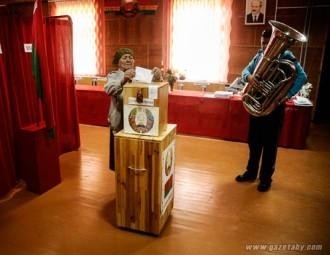Authorities have concerns re opposition abstaining from president election

The Belarusan authorities have voiced concern about the opposition lacking an agreement about the opposition candidates and the presidential campaign scenarios.
Opposition politicians have started refusing to participate in the 2015 presidential elections.
Last week, ‘For Freedom’ movement announced that it would not nominate its candidate or support others in the 2015 presidential race. Earlier, ‘Nash Dom’ campaign and its leader Olga Karach has made a similar statement. The authorities have not quite expected such moves, as they hoped to have many candidates in the upcoming presidential campaign. Nikolai Lozovik, CEC Secretary, said the authorities were disappointed about the lack of clarity in the opposition’s plans in the elections: “We would like to see the opposition to be more actively involved in the preparations for the presidential elections”.
All last year, opposition leaders tried to agree on the ‘single candidate’ nomination procedures for the 2015 presidential elections, but to no avail. Earlier this year, the ‘People’s Referendum’ initiators tried to identify a joint candidate for the presidential campaign from this coalition. Recently they named a few possible presidential candidates, among which, however, neither Niakliaeu, nor Milinkevich were listed.
Currently, their readiness to take part in the presidential race have confirmed incumbent President Aliaksandr Lukashenka, Anatoly Liabedzka, the United Civil Party leader, Sergei Haidukevich, LDPB leader, and Tatsiana Karatkevich, activist of the ‘Tell the Truth!’ campaign – her nomination has also been supported by the Belarusan People’s Front.
The Internet audiences have favorably received the female candidate. According to the polling results on TUT.BY Internet portal, Tatsiana Karatkevich has won the highest number of supporters finishing well ahead of other potential women candidates. Several women’s organisations have also supported Karatkevich’s nomination. Tatsiana may become the first female presidential candidate in the history of independent Belarus. The Belarusan propaganda has not yet dealt with female candidates and may not have sufficient arsenal for that.
President Lukashenka seemed satisfied that the opposition, influenced by events in Ukraine, had abandoned their strategy of force regime change on the election day, “they thereby demonstrated that they are not ready to take power in Belarus and to retain the country. I am glad if it is so. They are not trying to gain power – thank God! If you cannot retain the country, you should not take the power, should take this responsibility.” Meanwhile, IISEPS’ polls suggest, that Lukashenka’s ratings continue to fall due to deteriorating socio-economic situation and reduced social protection.
Nevertheless, the Belarusan authorities have launched a mobilisation campaign in preparation for the elections. Interior Minister Ivan Shunevich said that the law enforcement agencies were ready for any developments and assured the Belarusan MPs that “special preparations for the elections are carried out not only by the Interior Ministry. This is a very significant and important event.” In addition, ‘Belaya Rus’ quango and the Belarusan Republican Youth Union have revitalised and stepped up their activities.
The opposition, however, is not very active in preparing for the upcoming elections. For example, ‘For Freedom’ movement plans to continue to popularise the “People’s Programme’s” economic provisions and the "People’s referendum" peaceful change strategy, carry out election observation and campaign for the release of political prisoners.
The opposition might nominate several candidates for the presidency and unite its efforts in the framework of electoral alliances. The authorities are interested in the opposition determining their election policies as soon as possible in order to prevent the 2010 scenario – with many alternative candidates and the lack of clear vision on the election day.
-
03.01
-
07.10
-
22.09
-
17.08
-
12.08
-
30.09








































